Past Events

- Maria C. Taylor
- 4130 Posvar Hall
The UN’s Intergovernmental Panel on Climate Change recently predicted that global average temperatures will rise 1.5 degrees Celsius above preindustrial levels in the mid-2030s. Over the last decades, a global network of scholars, policy makers, activists, and others have organized to offer ways to mitigate and even reverse the effects of climate change. What offramps can these solutions and movements offer our collective humanity? “Eurasian Environments” seeks to provide some reflections to mark the UN’s 2024 Climate Change Conference in Baku, Azerbaijan. This series will examine social justice and sustainability efforts to address climate change by putting scholars of Eurasia in conversation with their peers specializing on Africa, the Americas, Asia, and Europe. The series will comprise six events that will illuminate the challenges and possible solutions to climate change in Eurasia in regional and global contexts. This event is part of the Eurasian Environments: Climate Justice and Sustainability in Global Context series.
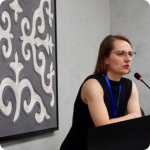
- Elena Kochetkova
- 4217 Posvar Hall
The presentation discusses the role of local public libraries in shaping memory about the Great Patriotic War in Russia today. With a particular focus on the Northwest of Russia, it will demonstrate how local libraries practice an emotional approach to commemoration, building close connections with their audiences through the feelings and personal histories they convey by means of material objects. Rendering local public libraries as powerful memory influencers in the region, the presentation will show their contribution to promoting local patriotism and remembering the militarized past. Elena Kochetkova is currently an Associate Professor of Modern European Economic History at the Department of Archeology, History, Cultural Studies and Religion at the University of Bergen. She is the author of the monograph "The Green Power of Socialism: Wood, Forest, and the Making of Soviet Industrially Embedded Ecology" (MIT Press, 2024). She is currently working on a monograph on food modernity under state socialism. She is also working within the project "'Memory Politics of the North, 1993-2023", funded by the Norwegian Research Council.

- Molly McSweeney
- Global Hub
Attention: Undergraduate students! Are you looking to gain experience that will help prepare you for a globally-connected job market? Stop by Drop-In Hours to learn more about getting the Global Distinction added to your academic transcript, receiving special recognition at graduation, and standing out to prospective employers!
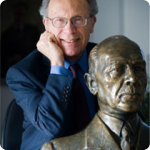
- John Palka
- Cathedral of Learning 332
Dr. John Palka is a retired professor of biology at the University of Washington with a specialty in neuroscience. He is the winner of numerous prestigious academic awards, including election as a Fellow of the American Association for the Advancement of Science, two Fulbright Fellowships for teaching in India, and a Guggenheim Fellowship for research in Cambridge, England. He also co-founded and co-directed the University of Washington's highly lauded Program on the Environment. A two-time refugee from his Slovak homeland- in 1939 from the Nazis and in 1949 from the Communists- Dr. Palka has retained his love for Slovakia and his fluency in the Slovak language. Over the years he has visited his family in Slovakia often. These experiences inspired his research into the role that many generations of his family played in the national life of Slovakia, laying the foundation for his book My Slovakia, My Family: One Family's Role in the Birth of a Nation.
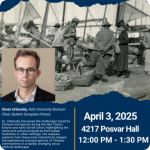
- Sören Urbansk
- 4217 Posvar Hall
Sören Urbansky, Ruhr University Bochum Chair, Eastern European History Dr. Urbansky discusses the challenges faced by Chinese immigrants during the late Tsarist Empire and early Soviet Union, highlighting the racial and cultural prejudices that fueled hostilities in urban settings. His analysis explores how these early interactions shaped the experiences and perceptions of Chinese communities in a rapidly changing socio-political landscape.

- Molly McSweeney
- Global Hub
Attention: Undergraduate students! Are you looking to gain experience that will help prepare you for a globally-connected job market? Stop by Drop-In Hours to learn more about getting the Global Distinction added to your academic transcript, receiving special recognition at graduation, and standing out to prospective employers!

- Zharia White
- Global Hub
Are you an international student at Pitt looking to connect, or interested in connecting with international students? Stop by the Nook in the Global Hub on Tuesdays, between 2 and 4 pm during Spring semester, to chat with OIS Outreach Coordinator Zharia White from the Office of International Services!

- Janet McLaughlin
- Global Hub
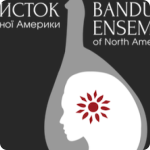
- Various
- Bellefield Hall
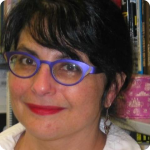
- Belinda Davis, Rutgers University
- Wesley Posvar, Room 5601
Please note a change of time:
Keynote Speaker for the Undergraduate Research Symposium:
The Discussion will explore one of the means by which primarily young people in West Germany attempted to “revolutionize” everyday life and beyond, through new, explicitly political forms of cohabitation designated Wohngemeinschaften (WGs). WGs served as critical hubs of more conventional popular politics of the era, but also housed intense experiments in remaking the self and relations with others, transcending the nuclear family and the centrality of the couples relationship, and working through ideas and convictions across populations often conceived as incompatible. Part of broader efforts to remake German society from the bottom up, these experiments mark one site of successful youth efforts to transform the world around them.
About the Speaker:
Belinda Davis is a professor of history at Rutgers University and director of the Rutgers Center for European Studies. She is author or co-editor of five books, including the coedited Social Movements After ’68: Selves and Solidarities in West Germany and Beyond (2022); The Internal Life of Politics: Extraparliamentary Opposition in West Germany, 1962-1983 (forthcoming with Cambridge). She is currently completing work on Voices of the Organized Poor: Learning from the Poor People’s Economic Human Rights Campaign’s Everyday Struggles for Survival and Alternative Futures; and working on an environmental history of modern Europe for Cambridge University Press. She is a member of the Rutgers team participating in the Jean Monnet-funded ValEUs grant, of which the University of Pittsburgh is also a consortium member.

- Daniel Scarborough
- 5601 Posvar Hall
Orthodox Christianity first came to Central Asia along with the Russian conquest in the 19th century. Along with Slavic settlers came Orthodox sacred objects, such as miraculous icons and the relics of saints. Churches, monasteries, and parish communities were build around these objects. During the colonisation process, control over Orthodox sacred objects was contested by the imperial regime, settler communities, and the native population. These objects ultimately became targets of violent conflict during the anti-colonial uprising of 1916, and the revolutionary violence and terror of the following decade. The physical survival of the Orthodoxy in Central Asia was possible due to the collaborative efforts of both settlers and natives, despite the efforts of the colonial regime to utilise the Church for the consolidation of Russian rule. The Orthodox objects and spaces that dot the landscape today comprise part of Central Asia's shared cultural heritage.
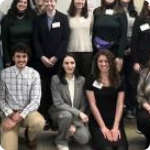
- Posvar Hall
The European and Eurasian Undergraduate Research Symposium is an annual event since 2002 designed to provide undergraduate students, from the University of Pittsburgh and other colleges and universities, with advanced research experiences and opportunities to develop presentation skills. The event is open to undergraduates from all majors and institutions who have written a research paper from a social science, humanities, or business perspective focusing on the study of Eastern, Western, or Central Europe, the European Union, Russia, or Central Eurasia.
After the initial submission of papers, selected participants are grouped into panels according to their research topics. The participants then give 10- to 15-minute presentations based on their research to a panel of faculty and graduate students. The presentations are open to the public.
SYMPOSIUM: Friday, March 28, 2025
APPLICATION DEADLINE: Friday, January 10, 2025
https://www.ucis.pitt.edu/creees/urs
QUESTIONS? Contact Zita Tóth-Shawgo
SPONSORS
Center for Russian, East European, and Eurasian Studies
Consortium for Educational Resources on Islamic Studies
European Studies Center
University Center for International Studies
Graduate Organization for the Study of Europe and Central Asia
Kenneth P. Dietrich School of Arts and Sciences
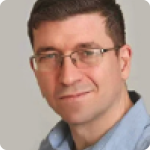
- Daniel Scarborough
- Department of History Lounge, Posvar Hall, 3rd Floor
Russia's full-scale invasion of Ukraine on February 24, 2022 has resulted in the closure of Russia to western researchers, and a redirection of Russophone scholarship toward Central Asia. How has this phenomenon affected the academic communities and institutions of Central Asia? This workshop will examine several examples of "public history" in the region, including Nazarbayev University's "E-atlas of Kazakhstan's Sacred Geography," Harvard University's Central Asian Archive Project, and the speaker's own oral history project on the Orthodox clergy's role in the promotion of Kazakh language.

- Daniel Briggs, Lauren Herzer Risi
- 4130 Posvar Hall
The UN’s Intergovernmental Panel on Climate Change recently predicted that global average temperatures will rise 1.5 degrees Celsius above preindustrial levels in the mid-2030s. Over the last decades, a global network of scholars, policy makers, activists, and others have organized to offer ways to mitigate and even reverse the effects of climate change. What offramps can these solutions and movements offer our collective humanity? “Eurasian Environments” seeks to provide some reflections to mark the UN’s 2024 Climate Change Conference in Baku, Azerbaijan. This series will examine social justice and sustainability efforts to address climate change by putting scholars of Eurasia in conversation with their peers specializing on Africa, the Americas, Asia, and Europe. The series will comprise six events that will illuminate the challenges and possible solutions to climate change in Eurasia in regional and global contexts. This event is part of the Eurasian Environments: Climate Justice and Sustainability in Global Context series.
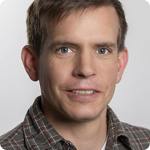
- Jan Musekamp
- 4130 Posvar Hall
In the interwar period, a Polish Consulate served Pittsburgh's sizeable population with Polish roots. The last consul before the Second World War was Heliodor Sztark, who came to Pittsburgh in 1938, together with his wife, Aniela and their younger daughter Nina. All three became active public figures within the Polish community, the city of Pittsburgh, and Pitt. After the war, Heliodor resigned from his post because he did not agree with the new Polish government.
The family settled in Texas, where they started a new life under very difficult conditions. Their older daughter remained in Poland, but stayed in close contact with the US branch of the family.
The talk will focus on the Sztark family's trajectory before, during, and after their stay in Pittsburgh. Based on material from the Pittsburgh Polish newspaper "Pittsburczanin," interviews with descendants, and documents from archives in the US, Poland, and Germany, Professor Jan Musekamp will demonstrate how an East Central European family navigated realities in independent and wartime Poland, and the Cold War United States.
- ‹ previous
- 2 of 46
- next ›
